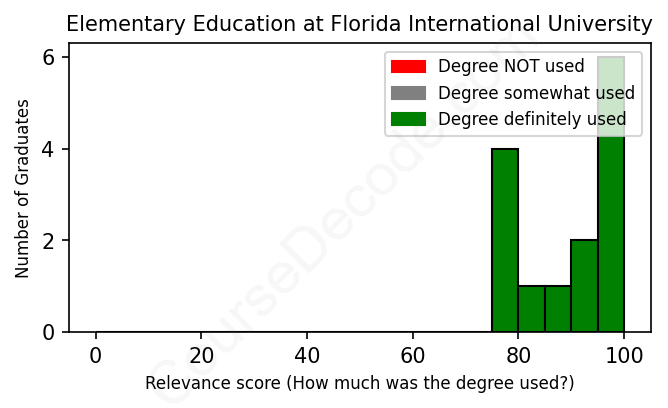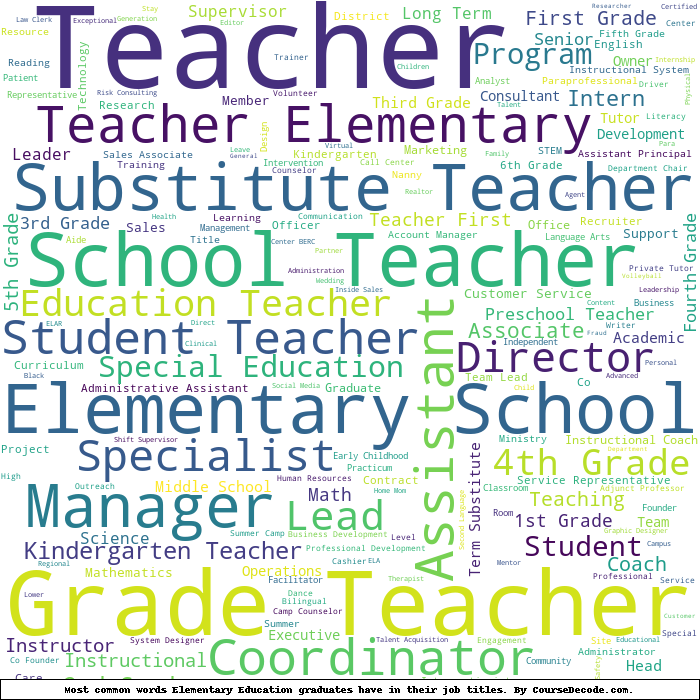
First, some facts. Of the Elementary Education graduates from Florida International University we've analyzed , here's how many have used (or NOT used) their degree in their career:

These are estimates based on AI analysis of 14 LinkedIn profiles (see below).
The verdict? Great! Overall, with an average relevance score of 89%, Elementary Education graduates from Florida International University have a substantially higher likelihood (+22%) of finding work in this field compared to the average graduate across all fields:
And for comparison, here's the chart for all profiles we've looked at across all degrees.
Also, after graduating, only 28% of these graduates have pursued further education other than another Bachelor's degree (such as a Masters degree or other), compared to the average across all profiles of 35%. This suggests a Bachelors degree is enough for most Elementary Education graduates, and it's normal to look for work straight after graduation.
See the details:
|
Relevance score: 97% We think this person has gone into a career highly relevant to their degree. We think this person has gone into a career highly relevant to their degree.
DEGREE INFOGraduated in 2014 from Florida International University with a Bachelor's degree in Elementary Education. Also pursued further education since (see below). JOB HISTORY SINCE GRADUATIONElementary Educator Miami-Dade County Public Schools 2014 - 2019 Elementary School Teacher  Miami-Dade County Public Schools 2014 - 2019 Focus Group  Miami-Dade County Public Schools Sep 2018 - Jun 2019 Educator  Gwinnett County Public Schools Aug 2019 - Jun 2020 Educator  Bethel School District Aug 2020 - Dec 2020 Educator  Miami-Dade County Public Schools Aug 2020 - Dec 2021 Educator  Miami-Dade County Public Schools Oct 2020 - Oct 2022 FURTHER DEGREES DONE SINCE GRADUATINGMaster's degreeFlorida International University 2016 - 2019 ABOUTAs a professional, my goal is to do the best that I can do in any situation. I am an outgoing and trustworthy individual that takes pride in any task, no matter how big or small. I am a quick learner and accept challenges in all areas. In all of the previous positions, I have proven to thrive in all aspects of the work entailed. When working with others, I believe it is at the utmost importance to listen carefully to one another, collaborate to ensure that all aspects of the job are taken care of effectively and communicate clearly and efficiently. Being a teacher has prepared me to be able to multi-task effectively, adapt to new environments each year and work with a diverse group of individuals and personalities. |
The top 10 most common jobs done by the graduates we've analyzed (ranked most common to least) are:
When looking at the job trajectories of individuals who graduated with a degree in Elementary Education from Florida International University, the most common roles they landed are primarily in teaching positions. Most graduates took on roles like classroom teachers in public or private elementary schools, working with various grade levels, which directly align with their degree. Other roles like Literacy Coach and Curriculum Director also appear, which utilize the educational knowledge they gained. However, a few graduates ventured into roles that seem less relevant, such as Human Resources positions or sales, which don't typically require a strong foundation in elementary education principles.
Overall, it’s evident that the majority of these alumni found work that is closely related to their field of study. While some jobs, like private tutoring or positions in sales and management, might only loosely tie back to what they learned, the core of their profession is centered around teaching and educational support. So, a solid chunk of these graduates are applying their knowledge in relevant ways within education settings, proving that their degrees were well-suited for the paths they chose.
Here is a visual representation of the most common words in job titles for Elementary Education graduates (this is across all Elementary Education graduates we've analyzed, not just those who went to Florida International University):

The career trajectories of graduates from Florida International University with a degree in Elementary Education show a strong foundational commitment to teaching and education-related roles. For many of them, the first jobs post-graduation are typically in teaching, often starting with substitute or student teaching positions, which is a great way to gain hands-on experience. Over the years, it's apparent that most of these graduates stick with education; they end up in various teaching roles, often progressing to specialized positions like literacy coaches or even curriculum directors. It's clear that their initial steps lead them toward building solid careers within the educational field.
However, while a good number of these graduates stick with teaching, some did branch out into different fields after a few years. A few went into roles like outreach specialists and management positions in non-education sectors, which shows that the skills gained from their education degrees can translate into other areas. So, although many alumni have carved successful paths in education, it’s also evident that some have veered away into different careers altogether. Overall, it seems that the graduates initially find their footing in the classroom but some navigate their way into diverse career paths over time.
Honestly, a Bachelor’s degree in Elementary Education at Florida International University is pretty manageable, especially if you enjoy working with kids and have a passion for teaching. The program typically includes a mix of classroom theory, hands-on teaching experiences, and core education courses, which can be fun if you're into that stuff. Some people might find the workload a bit heavy with all the projects and student teaching requirements, but if you stay organized and engaged, it's definitely doable. Compared to other degrees, it might feel a bit easier because it’s more focused on practical skills and real-world applications rather than just heavy theory. Just be prepared to put in the effort, especially during your practicum!
Most commonly, in the LinkedIn profiles we've looked at, it takes people 4 years to finish a Bachelor degree in Elementary Education.
Looking at the job history of these FIU Elementary Education grads, it seems like they're on a pretty typical path for teachers, which doesn't always translate to big bucks. Most of them started with internships and short-term positions, then moved into teaching roles, primarily in public schools, where pay can vary but often isn't super high, especially in the early years. Some have moved up to roles like Literacy Coach or School Principal, which likely come with better salaries, but that can take a while. There’s also a couple of them who mixed in roles outside of traditional teaching, which could suggest they’re trying to boost their earnings. Overall, while they might not be rolling in money, many seem to be building solid careers in education, but it looks like they’re playing the long game when it comes to financial stability.
Here is a visual representation of the most common words seen in the "about" section of LinkedIn profiles who have a Bachelor degree in Elementary Education (this is across all Elementary Education graduates we've analyzed, not just those who went to Florida International University). This may or may not be useful:

Here are all colleges offering a Bachelor degree in Elementary Education (ordered by the average relevance score of their Elementary Education graduates, best to worst) where we have analyzed at least 10 of their graduates: